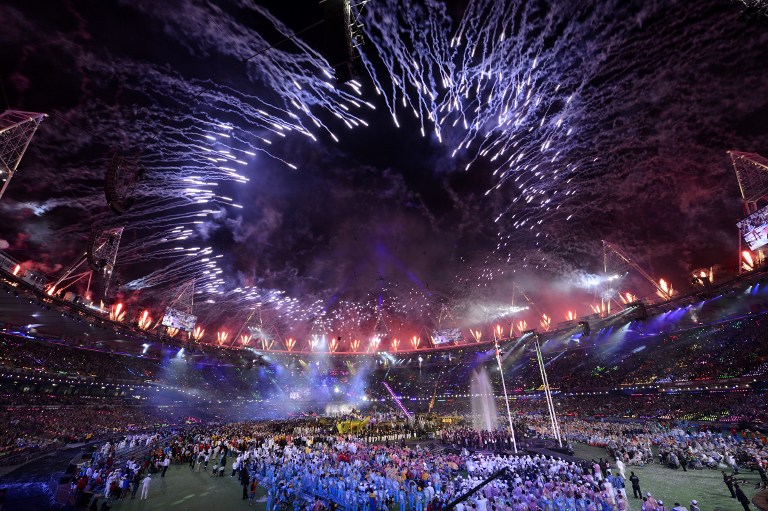SUMMARY
This is AI generated summarization, which may have errors. For context, always refer to the full article.

LONDON, United Kingdom – London on Sunday, September 9 (Monday, September 10 in Manila) bid farewell to the Paralympics, with a spectacular celebration of the human spirit, amid claims the Games had led to a “seismic” shift in attitudes towards disability.
Coldplay, Rihanna and Jay-Z headlined a three-hour festival of song and dance in front of 80,000 spectators at the Olympic Stadium, with flame-throwers, fantastical vehicles, roller-skating warriors and stunning aerial acrobatics.
Top British athletes Ellie Simmonds and Jonnie Peacock extinguished the flame, signaling the formal end to the Games and the start of the countdown to the next edition in Rio de Janeiro in 2016.
London 2012 chief Sebastian Coe said the Paralympics and the Olympics before it had been an “historic odyssey of human achievement and endeavor” that had been an “inspiration” to everyone involved.
“The Paralympic Games has set new records every day, sporting records, records for crowds, for television audiences, for unbridled spirit,” he told the crowd.
“In this country we will never think of sport the same way and we will never think of disability the same way. The Paralympians have lifted the cloud of limitation.”
As fireworks exploded over the British capital, a message was projected on to the side of the British parliament on the banks of the River Thames: “Thank you London, thank you UK.”
Organizers hailed the Paralympics as the biggest and most high-profile in its 52-year history, with more media attention and a record number of athletes from more than 160 countries, including for the first time reclusive North Korea.
Coe said earlier that with 2.7 million tickets sold, packed venues and vocal crowds, the Games had created a global platform for elite disabled sport and also helped change perceptions of people with disabilities.
“I really genuinely do think that we have had a seismic effect on shifting public attitudes,” he told a news conference, adding that the focus had been on “what we can do rather than what we can’t do”.
‘Hardcore sport’
The final golds of the Games — in the marathon, wheelchair rugby and seven-a-side football — ended the action, which notably saw the Games’ most high-profile athlete Oscar Pistorius stripped of his 100m and 200m crowns but then conclude the track and field program with a stunning victory in the 400m.
New stars have been found to challenge the South African “Blade Runner”, who made history last month by becoming the first double-amputee to compete at the Olympics, and the focus of the Games has shifted away from disability.
“I think people are going to look back at this Paralympic Games and for the first time really, truly believe that Paralympic sport is not just inspirational, it’s hardcore sport,” said Pistorius.
“It’s full of triumph, sometimes it has disappointment, but that’s what we look for in sport. We want it to be competitive and that’s what it’s been about.”
London was awarded the Olympics and Paralympics in 2005 and has had to face doubts in particular over the cost of the project, security and whether the city’s creaking transport system could cope with a massive influx of visitors.
But the efficient running of both events and the public response has defied naysayers who predicted chaos and a lack of enthusiasm.
The president of the International Paralympic Committee, Philip Craven, said London had hosted “the best Paralympic Games ever” but the challenge was to maintain interest — as well as increase participation around the world.
“We have to really concentrate on getting every country doing more Paralympic sport,” he added.
The daughter of German-Jewish neurologist Ludwig Guttmann, who organized the first recognized sporting event for disabled people in southern England in 1948, also said there was more work to do despite improvements since her father’s time.
“We are not there yet. There is a way to go,” said Eva Loeffler, highlighting continued issues around accessibility for disabled people in society.
More countries needed to send athletes to the Paralympics, she said, but added that the greater exposure afforded to Paralympians was positive.
“I think that more people will realize that disabled people are people,” she added. – Phil Hazlewood, Agence France-Presse
Add a comment
How does this make you feel?
There are no comments yet. Add your comment to start the conversation.